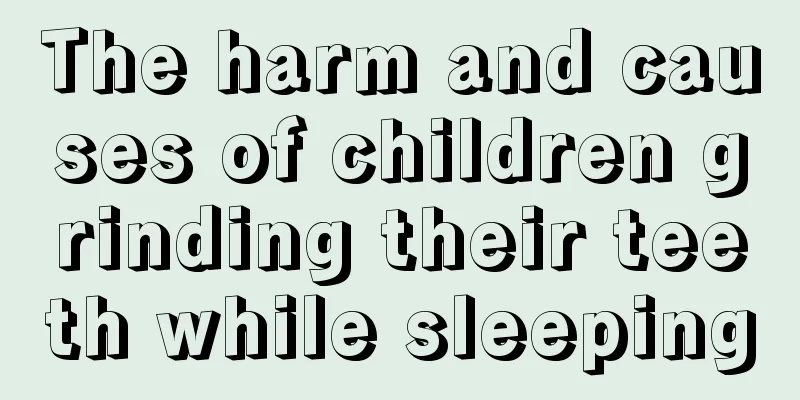The harm and causes of children grinding their teeth while sleeping

|
Teeth grinding while sleeping is more common among children. After falling asleep at night, his teeth would make a "clacking" sound, which made his parents uneasy. If you grind your teeth once or twice at night, it will not affect your health. If you grind your teeth every night, it will cause great harm. One is direct damage to the teeth. Grinding your teeth every night will cause your teeth to wear out prematurely; Second, the periodontal tissue is damaged, which can easily cause the facial muscles, especially the masticatory muscles, to contract continuously. Over time, the masticatory muscle fibers become thicker, the face becomes square, and the beauty of the child's face is affected; Third, if the tooth tissue is severely worn, temporomandibular joint disorder syndrome may occur, causing pain in the mandibular joint and local muscles, and even difficulty opening the mouth when the child speaks, sings or eats. In addition, it can also cause symptoms such as headache, facial pain, insomnia, and memory loss. Why do children grind their teeth at night? Parents should first find out the cause of teeth grinding and then come up with a strategy to deal with it. Reason 1: Ascaris and pinworms parasitizing in the stomach and intestines can cause teeth grinding Ascaris parasitizes in children's small intestine, not only robbing nutrients but also irritating the intestinal wall, secreting toxins and causing indigestion. This will cause the child's stomach to often ache, causing insomnia, irritability and nighttime teeth grinding. In addition, pinworms can also cause children to grind their teeth. Pinworms usually live in the large intestine of children. After the child falls asleep, the pinworms will quietly crawl to the anus to lay eggs, causing anal itching, making the child sleep uneasily and causing teeth grinding. Coping strategy: Go to the hospital to have your child’s stool tested, and give your child anthelmintic medicine as prescribed by the doctor. Especially in daily life, we should develop good hygiene habits. Reason 2: Eating too much for dinner can also cause children to grind their teeth while sleeping Eating too much at dinner or having a snack before going to bed will not only affect the absorption of nutrients, but also increase the burden on the gastrointestinal tract. Because when you fall asleep, there is still a lot of undigested food accumulated in the gastrointestinal tract, the entire digestive system has to "work overtime" and continue working. Even the chewing muscles are mobilized and involuntarily contract, causing teeth grinding. Coping strategy: Don’t let your child eat too much before going to bed. Let your child stay for a while after eating before letting him go to bed. Reason 3: Vitamin D deficiency causes rickets to grind their teeth at night Children who lack vitamin D are prone to rickets. Vitamin D deficiency rickets is a common nutritional deficiency in infancy and childhood. It is a systemic chronic nutritional disease characterized by bone lesions due to insufficient vitamin D in children, which disrupts calcium and phosphorus metabolism. The typical manifestation is incomplete mineralization of the growing metaphysis and bone tissue. Vitamin D deficiency causes incomplete mineralization of mature bones, which manifests as osteomalacia. Children with rickets will suffer from bone decalcification, muscle aches and autonomic nervous system disorders due to calcium and phosphorus metabolism disorders in the body. They often experience excessive sweating, night terrors, irritability and nighttime bruxism. Coping strategies: Under the guidance of a doctor, supplement your child with vitamin D and calcium tablets, and let him or her get more sun exposure. The nighttime teeth grinding will gradually decrease. Reason 4: Too much tension in the nervous system leads to nighttime bruxism A few children do not usually grind their teeth, but if they listen to a gripping story before going to bed, or just finished watching scary or tense TV or cartoons, they may grind their teeth at night because their nervous system is over-excited. Another reason is stress. For example, children may not adapt to kindergarten life, be afraid of a certain child in the class, quarrel with parents or family members, etc. These may make children nervous and cause them to grind their teeth when they sleep at night. In addition, some overactive children may also experience nocturnal grinding. Coping strategy: Don’t let your children watch overly stimulating TV before going to bed. Communicate frequently with teachers and children. If the child has any emotional issues, help him resolve them in a timely manner and relieve his psychological pressure. Reason 5: Misaligned teeth can also cause nighttime bruxism Excessive use of the chewing muscles or chewing with one side of the teeth for a long time, as well as poor tooth occlusion and temporomandibular joint dysfunction, can also cause nocturnal bruxism. Moreover, children with irregular teeth often have abnormal positions of their chewing muscles. When they sleep at night, their chewing muscles often contract unconsciously, causing bruxism. Coping strategy: Take your child to see a dentist regularly and do tooth correction and treatment according to the doctor's advice. Reason 6: Bad sleeping posture can also cause teeth grinding If a child's head often tilts to one side when sleeping, it will cause incoordination of the chewing muscles, causing abnormal contraction of the chewing muscles on the compressed side, resulting in bruxism. When children sleep with their heads covered at night, excessive accumulation of carbon dioxide and insufficient oxygen supply may also cause bruxism. Coping strategy: If you find that your child has a bad sleeping position, you should help him adjust it in time. Don’t let your children develop the habit of covering their heads when sleeping. |
<<: Six breakfast foods to keep your child nutritious
>>: Babies who often go to bed late may suffer from IQ damage
Recommend
What to do if your child's lower body is red and itchy
Parents are always particularly concerned about t...
What should you pay attention to when your baby eats complementary food for the first time?
When babies reach four or six months old, they wi...
Is it normal for a baby to start teething at 4 months old?
We know that babies usually grow teeth at 6 month...
How to care for infantile hemangioma?
When a baby is young, any slight discomfort in th...
How to reduce phlegm in children?
The weather is getting cooler now, but some child...
Why does the child cry non-stop in the middle of the night?
Sometimes it is really hard to stop a baby from c...
Why do children get meningitis?
When meningitis occurs in children, it is easy fo...
How to remove the red spots on babies caused by mosquito bites
Children's skin is relatively delicate. In th...
Nursing is also important for children undergoing heart surgery
Children's physical constitution is relativel...
Several misunderstandings about baby supplements---ignorant love equals harm
As a nutritionist and a mother, I certainly pay m...
What are the things to pay attention to when choosing a cooling patch?
Whenever the seasons change, many people with low...
Symptoms of adenoid hypertrophy in children
When it comes to adenoids hypertrophy, many peopl...
How to treat lupus nephritis in children
In fact, when children are in their daily lives, ...
Child vomits in the middle of the night
Many children are prone to vomiting in the middle...
Capturing children's sensitive periods
From the time a child is born, he or she can walk...









